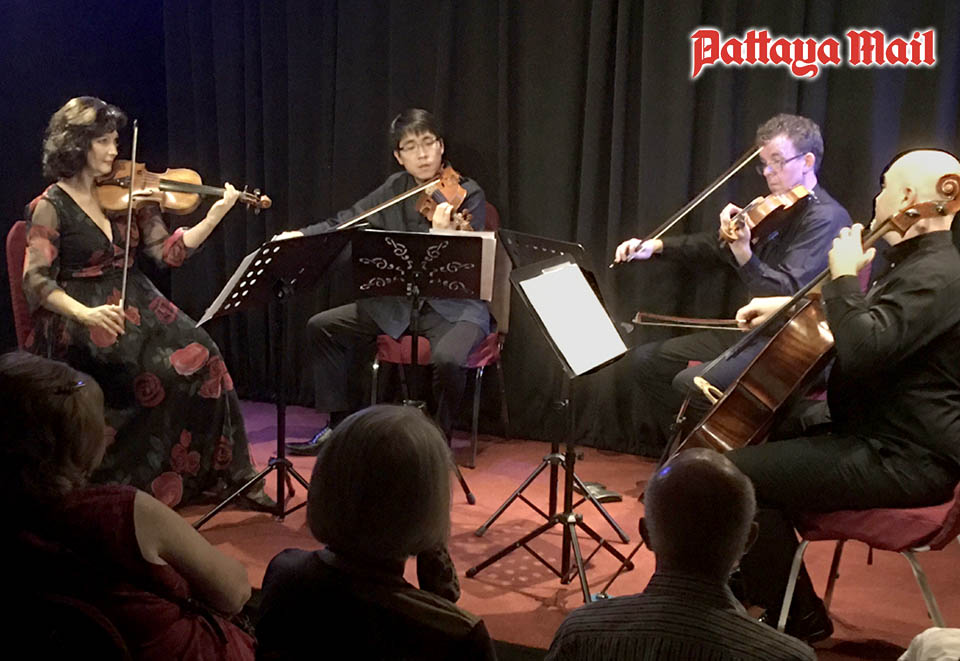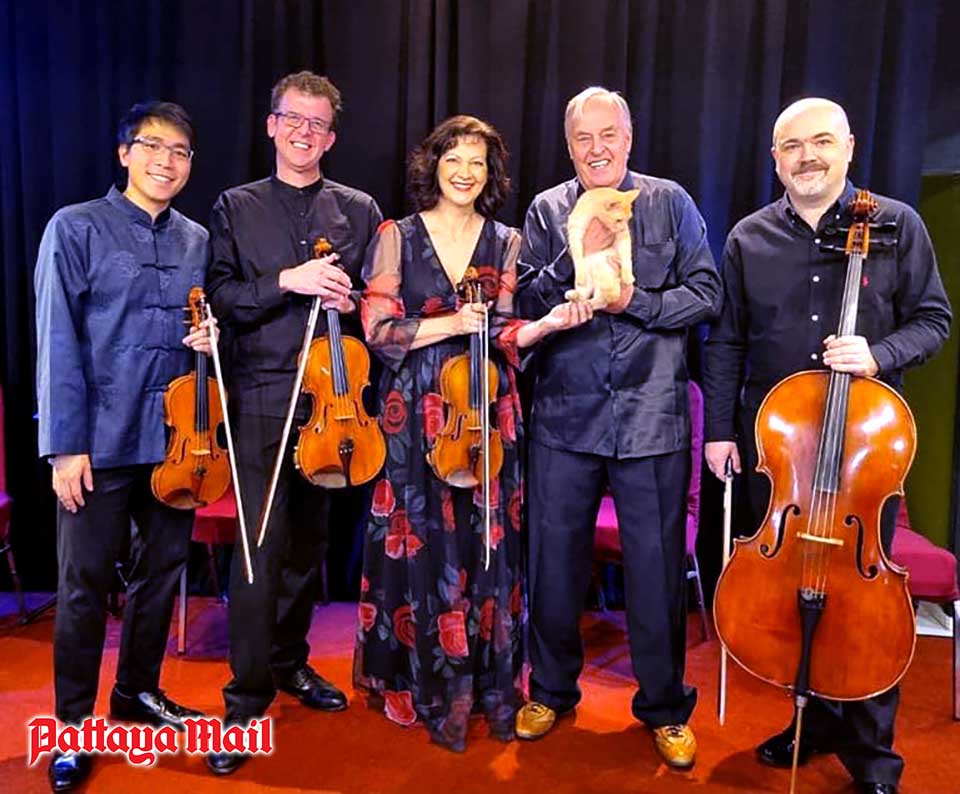
The Libere Quartet
From the first note, a luminous and vibrant G sharp from Marcin Szawelski’s cello, it was clear that something special was about to happen. It was a full house at Ben’s Theater and expectations was running high. Not only were we promised a programme of fascinating and rarely-heard music, but the members of the Libere String Quartet are some of the finest string players in Thailand, most of them principal or sub-principal players in the Thailand Philharmonic Orchestra, one of the most successful symphony orchestras in South East Asia.
The Libere String Quartet began their programme with an early work by the Italian opera composer Giacomo Puccini, known for his penchant for Toscano cigars, loose women and fast cars. In 1901, while basking in the success of Tosca, he bought his first car, the first of many. It wasn’t particularly fast either, being a compact De Dion Bouton which could potter along at a stately 40 kph. Two years later, on 25 February 1903, Puccini was in a near-fatal road accident, though his chauffeur was driving at the time. During the long convalescence which followed, he wrote the opera Madama Butterfly which was premiered almost exactly one year after the accident.
When he was a student at Milan Music Conservatoire, Puccini wrote a handful of works for string quartet. One of them was a single–movement piece called Crisantemi (“Chrysanthemums”) written as an elegy after the death of a friend. It is an intensely powerful work and was given a superb and moving performance by the Libere String Quartet. Their sonorous string tone was enchanting and the players brought a sense of shape to the work with beautifully expressive phrasing. Throughout the recital, I continued to be impressed with the remarkably rich string tone produced by these talented musicians.
Like Puccini, the Brazilian composer Heitor Villa-Lobos was rarely seen without a cigar or cigarette. He initially learned music from his father and by the end of his teenage years, he was earning his living as a cellist, playing in bars and cafés in Rio de Janeiro. In later years, he travelled into the Brazilian forests to record Indian songs on wax recording cylinders. His vivid accounts of these journeys turned out to be somewhat exaggerated. With his fertile imagination, Villa-Lobos invented many fantastic travel tales about how he socialized with the cannibals of the Brazilian jungle. It wasn’t until the 1980s that many of his jungle stories were found to be partly or totally fictitious; invented by the composer in an attempt to appear more exotic. Nevertheless, by the 1940s Villa-Lobos had become the accepted representative of Brazilian music throughout the world and many of his two thousand works are imbued with the spirit of that country.
The String Quartet No 1 was composed in 1915 and the members of the Libere String Quartet had clearly spent a great deal of time rehearsing. The soul–searching first movement was given a charismatic expressive performance, with the sumptuous tone quality that this quartet produces. The spiky second movement demonstrated brilliant ensemble playing, as well as the technical skills of the individual musicians. In the third movement the memorable melody shared between the viola and first violin, was superbly played with a captivating singing tone by Inga Causa (violin) and Danny Keasler (viola) The dark and brooding fifth movement (Melancholia) featured some beautifully expressive solo playing from Marcin Szawelski (cello). This wonderfully evocative music brings to mind images of dark Brazilian forests; images that Villa–Lobos knew well. The curiously–named finale, Jumping like a Jumping Bean was given a stunningly virtuosic performance with vigorous and tight ensemble playing from the quartet.

The Libere String Quartet is truly international. Inga Causa (violin) was educated in Latvia. She started to learn violin at age six and studied at the Riga Special Music School. Shortly after, Inga continued her education at the Latvian Music Academy. Aged eighteen, she joined the Latvian National Opera Orchestra and later the Latvian National Symphonic Orchestra. In November 2003, she arrived in Thailand to join the staff at the College of Music, Mahidol University. She’s currently Principal Second Violin with the Thailand Philharmonic. Mahakit Lerdcheewanan (violin) is from Thailand and began his musical training when he was twelve. Although he earned his Bachelor’s and Master’s degree at the College of Music, Mahidol University he obtained his Doctorate at Louisiana State University. Mahakit has performed with several American orchestras and in Thailand he has played mostly in the Thailand Philharmonic. Mahakit also has a passion for contemporary music and has premiered several new works. He is a faculty member at the College of Music, Mahidol University.
Daniel Keasler (viola) hails from America and he’s the Principal Viola in the Thailand Philharmonic. He received his Doctorate in Viola Performance from Florida State University. Danny founded the Thailand Viola Society and the first–ever Thailand International Viola Conference and he’s written several scholarly articles about viola playing. He’s also premiered many new works in Thailand and beyond. Marcin Szawelski (cello) is from Gdańsk in Poland, and he’s the Principal Cello with the Thailand Philharmonic. He began his musical training at seven and earned his Master’s degree from Stanisław Moniuszko Academy of Music. He teaches cello and chamber music at the College of Music, Mahidol University and has written two textbooks for cellists. Marcin has performed with countless international soloists and undertaken a great deal of orchestral coaching.
For the second half of the concert, violinists Inga and Mahakit swapped roles so that Mahakit was playing first violin and more able to demonstrate his fine playing and his skills as a competent leader. Webern’s short work entitled Langsamer Satz (“Slow Movement”) was written before the composer started composing his austere and somewhat inaccessible twelve–tone works. The Libere String Quartet gave a thoughtful performance of the piece, bringing out the fragile lines of melody and the wide dynamic range from a powerful sonorous forte to a gentle pianissimo with the delicacy of cut glass. I especially enjoyed Mahakit’s expressive and carefully phrased playing in this piece.
Webern of course is normally associated with the serial techniques that were developed the so–called Second Viennese School. However, political conditions didn’t favour radical musical styles and his music was banned. Unlike Villa–Lobos, he was not a prolific composer and published only about thirty works during his lifetime. He earned his living mainly by giving private lessons. One day in September 1945, Webern was smoking a cigar outside his home (yes, another smoker) when he was shot and killed by an American occupation soldier. The soldier, from North Carolina, was overcome by remorse and eventually died of alcoholism ten years later.
The Libere String Quartet concluded their recital with another work which is rarely performed today, the String Quartet No 2 in E flat major by the Anglo–Irish composer Ernest John Moeran. Although Moeran’s work was popular during his lifetime, it eventually fell out of fashion. Like Puccini, Moeran had a close encounter with death when in 1917, as a motorcycle messenger in the Army, he received a severe head wound. The resulting neural damage affected his behaviour and psychological stability for the rest of his life.
Moeran completed this string quartet in 1923. It has two movements and the first has a charming pastoral quality with reminders of Irish folk dance. The Libere String Quartet had clearly given a great deal of thought to their performance of the work and as usual, their tone quality and ensemble playing was exemplary. Dynamics were clearly defined and Mahakit led the quartet confidently through the varied moods of the piece. The work contains several lengthy viola solos and Danny Keasler impressed with his expressive and sonorous viola tone, especially in the low register. Some of the lyrical melodies bring Delius to mind and the lively jig-like sections sound distinctly Irish. It was a spell-binding performance of a neglected work.
Ben Hansen is the Proprietor and Director of Ben’s Theater and solely responsible for bringing some of the country’s finest musicians to Jomtien. After the concert he told me that it was “one of the best-ever instrumental concerts” at the venue. Many in the audience were delighted with the professional demeanor and the confidence of the musicians and judging from the warm enthusiastic applause, the recital was greatly appreciated. And in many ways, the recital contained remarkable performances: technically fluent playing, a superb sense of ensemble and togetherness, clear articulation, perfect intonation throughout and expressive phrasing and dynamic control. Most important of all, there was an impressive sense of musicianship, that hard-to-define quality that transforms an excellent performance into a magical one.
The Libere String Quartet will repeat this splendid programme on 30th January 2023 at the CRK Recital Hall, Payap University in Chiang Mai.
 |
 |
 |





